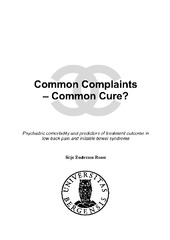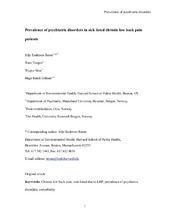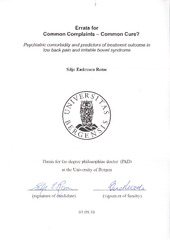| dc.contributor.author | Reme, Silje Endresen | |
| dc.date.accessioned | 2010-09-16T12:51:33Z | |
| dc.date.available | 2010-09-16T12:51:33Z | |
| dc.date.issued | 2010-09-01 | eng |
| dc.identifier.isbn | 978-82-308-1572-4 (print version) | eng |
| dc.identifier.uri | https://hdl.handle.net/1956/4187 | |
| dc.description.abstract | The basic hypothesis of the thesis is that the variance in individuals’ tolerance and acceptance of subjective health complaints is explained by CATS, the Cognitive Activation Theory of Stress. Sustained activation and rumination in cognitive loops elicit a psychobiological sensitisation in these loops. This is the theoretical foundation for the thesis. The thesis aims at investigating whether there is support for this position by three separate experiments. More specifically, the aims are to investigate the prevalence of psychiatric comorbidity in chronic low back pain (CLBP), predictors of treatment outcome after a brief cognitive intervention for CLBP, and predictors of treatment outcome after a cognitive behavioural therapy for irritable bowel syndrome (IBS). “Subjective health complaints” are complaints without known pathology or where the complaints exceed objective findings of pathology. Subjective health complaints are experienced by most people but endure and disables in some. In those who suffer from substantial subjective health complaints such as CLBP and IBS, additional somatic and psychological symptoms and complaints are frequent. Previous findings show a high degree of comorbid psychopathology in CLBP, but less is known about the broad range of psychiatric disorders. In paper I the prevalence of psychiatric comorbidity was investigated through structured diagnostic interviews of a large group of sick listed CLBP patients. The results showed a point prevalence of 30% for at least one psychiatric disorder. The diagnoses included a whole range of psychiatric disorders, with the most common being somatoform disorders and anxiety disorders. Besides psychiatric disorders, there were also a high degree of comorbid health complaints. This may support the hypothesis of a generalized sensitization where some individuals get more sensitive than others to a wide range of stimuli, resulting in high comorbidity. In paper II predictors of treatment outcome were investigated in CLBP patients after a brief cognitive intervention which has been found clinically and cost efficient in terms of return to work. Despite promising results, 30% did not profit from the treatment, and the aim of the paper was therefore to identify the patients who did not return to work. Psychological, cognitive, social and demographic variables were tested in order to see which variables that predicted non-return to work. Subjective and cognitive factors such as perceptions of disability and expectations of return to work were the strongest predictors of a poor treatment outcome (non-return to work). This is in line with the theoretical framework of the thesis, and confirms the importance of acquired expectations of own abilities to cope, as described by CATS. A surprising finding was that previous treatment by physiotherapists predicted prolonged sick leave. In paper III predictors of treatment outcome were investigated in an effective treatment for another group of patients with substantial subjective health complaints, namely IBS. It was hypothesized that cognitive behavioural treatments (CBT) aiming at changing cognitive and behavioural factors would be successful in treating IBS, and that these factors would predict treatment outcome. This was supported in the paper, where behavioural factors were found to predict treatment success in a tailored CBT treatment for IBS patients. CBT resulted in significantly reduced symptoms and increased function for the IBS patients compared to an antispasmodic treatment. IBS patients that were engaging in unhelpful behaviour at baseline, such as avoidance and control behaviour, were most likely to profit from the CBT treatment. The results thus indicate that CBT should be recommended to these patients. In conclusion, the thesis supports the theoretical position of CATS (Cognitive Activation Theory of Stress) in the understanding of CLBP and IBS, which is in line with the CBT model for treating CLBP and IBS. More specifically, psychological, cognitive and behavioural factors all appeared to be vital parts of the disorders, while cognitive and behavioural factors were crucial for treatment outcome. | en_US |
| dc.language.iso | eng | eng |
| dc.publisher | The University of Bergen | eng |
| dc.relation.haspart | Paper 1: European Journal of Pain 15 (10), Reme, S. E.; Tangen, T.; Moe, T.; Eriksen, H. R., Prevalence of psychiatric disorders in sick listed chronic low back pain patients, pp. 1075-1080. Copyright 2011 European Federation of International Association for the Study of Pain Chapters. Published by Elsevier. Reproduced with permission. Accepted version. The published version is available at: <a href="http://dx.doi.org/10.1016/j.ejpain.2011.04.012" target="_blank"> http://dx.doi.org/10.1016/j.ejpain.2011.04.012</a> | eng |
| dc.relation.haspart | Paper 2: BMC Musculoskeletal Disorders 10(139), Reme, S. E.; Hagen, E. M.; Eriksen, H. R., Expectations, perceptions, and physiotherapy predict prolonged sick leave in subacute low back pain. Copyright 2009 Reme et al; licensee BioMed Central. Reproduced with permission. Published version. The published version is also available at: <a href="http://dx.doi.org/10.1186/1471-2474-10-139" target="_blank"> http://dx.doi.org/10.1186/1471-2474-10-139</a> | eng |
| dc.relation.haspart | Paper 3: Journal of Psychosomatic Research 68(4), Reme, S. E.; Kennedy, T.; Jones, R.; Darnley, S.; Chalder, T., Predictors of treatment outcome after cognitive behaviour therapy and antispasmodic treatment for patients with irritable bowel syndrome in primary care, pp. 385-388. Copyright 2010 Elsevier. Full text not available in BORA due to publisher restrictions. The published version is available at: <a href="http://dx.doi.org/10.1016/j.jpsychores.2010.01.003" target="_blank"> http://dx.doi.org/10.1016/j.jpsychores.2010.01.003</a> | eng |
| dc.title | Common Complaints – Common Cure? Psychiatric comorbidity and predictors of treatment outcome in low back pain and irritable bowel syndrome | eng |
| dc.type | Doctoral thesis | |
| dc.rights.holder | Copyright the author. All rights reserved | |
| dc.rights.holder | The author | eng |
| dc.subject.nsi | VDP::Samfunnsvitenskap: 200::Psykologi: 260::Klinisk psykologi: 262 | nob |



